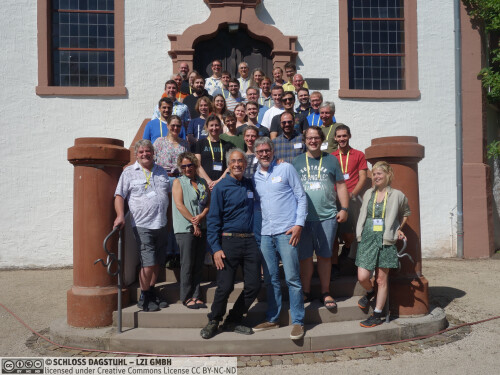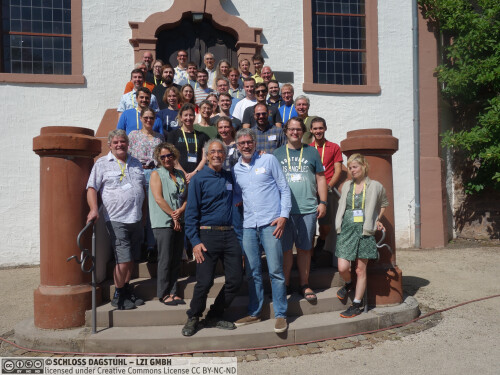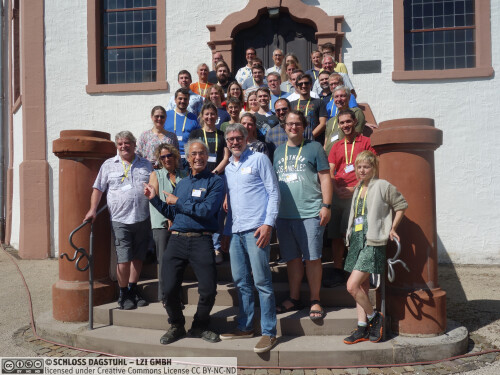Dagstuhl Seminar 24351
Power, Energy, and Carbon-Aware Computing on Heterogeneous Systems (PEACHES)
( Aug 25 – Aug 30, 2024 )
Permalink
Organizers
- Kerstin I. Eder (University of Bristol, GB)
- Timo Hönig (Ruhr-Universität Bochum, DE)
- Maja Hanne Kirkeby (Roskilde University, DK)
- Daniel Mosse (University of Pittsburgh, US)
- Max Plauth (UltiHash - Berlin, DE)
Contact
- Michael Gerke (for scientific matters)
- Jutka Gasiorowski (for administrative matters)
Schedule
The increasing carbon footprint of computing systems represents a critical and immediate challenge for the computing community, particularly as global digitalization accelerates. As computational demands grow - driven by data-intensive applications such as artificial intelligence - addressing the environmental impact of computing has become essential. The Dagstuhl Seminar 24351 on Power, Energy, and Carbon-Aware Computing on Heterogeneous Systems (PEACHES) focused on advancing the field’s understanding of how carbon emissions can be effectively measured, managed, and reduced across all layers of heterogeneous computing systems.
This seminar (PEACHES) brought together leading researchers and practitioners from the fields of computer science, software engineering, and environmental sustainability. The seminar participants explored 5 essential topics through continued group discussions. The participants explored boundaries, challenges, and possible new methods and techniques for: 1) obtaining Carbon Transparency, 2) reaching Net-Zero in the Age of AI and Machine Learning, and 3) achieving Carbon-Aware Computing, Storage, and Communication. In addition, we discussed and explored Disruptive Paradigms, focusing on innovative approaches needed to achieve net-zero carbon goals, rather than relying on incremental improvements. The seminar also featured enlightening Carbon-aware Computing Hackathons, introducing and discussing the latest research tools in the area, e.g., to reduce energy consumption via undervolting and tracking carbon emissions in applications. The seminar contributes to advancing the understanding of how software innovations can help mitigate the global environmental impact of computing.
 Kerstin I. Eder, Timo Hönig, Maja Hanne Kirkeby, Daniel Mosse, and Max Plauth
Kerstin I. Eder, Timo Hönig, Maja Hanne Kirkeby, Daniel Mosse, and Max Plauth
The carbon footprint of computers, the Internet, and its infrastructure is growing and it is comparable to the amount of the carbon emissions produced by the airline industry globally as of today. Reaching net-zero – neither a surplus nor a deficit of carbon emissions – imposes fundamental challenges and rethinking on how we design and construct computer systems for the future. As our world is becoming increasingly digitalized, there is an exponential increase in data to store, process, and explore, often involving the training and use of sophisticated AI models. This is driving the need for ever more compute and storage capacity, leading to a greater amount of energy demand and carbon emissions.
This Dagstuhl Seminar will bring together experts from computer science and computer engineering that share a common vision for power and energy-efficient computing. Five principal topic areas will be discussed:
Reaching Net-Zero in the Age of AI and Machine Learning
- How do we reduce the barriers to designing CO2-efficient AI systems, considering trade-offs between model precision and carbon emissions?
- How can we build tools that assess the operational carbon footprint of software?
- How do we efficiently utilize new technologies (e.g., non-volatile memory) to reduce the CO2 footprint of computing systems?
Carbon Transparency from Source to Sink
- Can we (and how) extend existing energy modeling to carbon modeling and execution (workloads and architectures), including computation, storage, and communication?
- What is the carbon emission information needed by toolchains (e.g., carbon “debuggers” or monitoring), and how to communicate it most efficiently and effectively?
- Can other environmental aspects such as water consumption, chemical waste, and noise emissions be derived from carbon emission metrics?
Carbon-aware Computing, Storage, and Communication
- How can we model the time-varying and spatially distributed carbon intensity of running applications at each location, including the cost of moving the data, computations, and results?
- Can we model the geospatial matching of energy consumption to renewable generation? How fine-grained must our geospatial awareness be?
Disruptive Paradigms
- How can we adapt to carbon-modulated computing and new hardware capabilities?
- What are the Wild And Crazy Ideas (WACI) to explore future carbon-neutrality?
Carbon-aware Computing Hackathons
- What are the practical techniques to reduce emissions? What are the suitable metrics?
- What are the pre-requisites, scope, and limits of each technique and does it transfer to other platforms/environments?
 Kerstin I. Eder, Timo Hönig, Maja Hanne Kirkeby, Daniel Mosse, and Max Plauth
Kerstin I. Eder, Timo Hönig, Maja Hanne Kirkeby, Daniel Mosse, and Max Plauth
- Gustavo Alonso (ETH Zürich, CH) [dblp]
- Antonio Carlos Schneider Beck Filho (Federal University of Rio Grande do Sul, BR) [dblp]
- Pierre Bennorth (CopenCloud - Karlslunde, DK)
- Liliana Cucu-Grosjean (INRIA - Paris, FR & StatInf - Paris, FR) [dblp]
- Ada Diaconescu (Telecom Paris, FR) [dblp]
- Kerstin I. Eder (University of Bristol, GB) [dblp]
- Tamar Eilam (IBM TJ Watson Research Center - Yorktown Heights, US) [dblp]
- Michael Engel (Universität Bamberg, DE)
- João Paulo Fernandes (New York University - Abu Dhabi, AE)
- Clemens Grelck (Friedrich-Schiller-Universität Jena, DE) [dblp]
- Daniel Gruss (TU Graz, AT) [dblp]
- Geerd-Dietger Hoffmann (Green Coding Solution - Berlin, DE) [dblp]
- Timo Hönig (Ruhr-Universität Bochum, DE) [dblp]
- Romain Jacob (ETH Zürich, CH) [dblp]
- Jonas Juffinger (TU Graz, AT) [dblp]
- Fiodar Kazhamiaka (Microsoft - Redmond, US) [dblp]
- Maja Hanne Kirkeby (Roskilde University, DK) [dblp]
- Michael Kirkedal Thomsen (University of Copenhagen, DK) [dblp]
- Sven Köhler (Hasso-Plattner-Institut, Universität Potsdam, DE) [dblp]
- David Kohnstamm (Leafcloud - Amsterdam, NL)
- Julia Lawall (INRIA - Paris, FR) [dblp]
- Silverio Martínez-Fernández (UPC Barcelona Tech, ES) [dblp]
- Daniel Mosse (University of Pittsburgh, US) [dblp]
- Frank Mueller (North Carolina State University - Raleigh, US) [dblp]
- Jukka K. Nurminen (University of Helsinki, FI) [dblp]
- Robin Ohs (Universität des Saarlandes - Saarbrücken, DE) [dblp]
- Vinicius Petrucci (Micron Technology- Austin, US)
- Max Plauth (UltiHash - Berlin, DE) [dblp]
- Fabian Rauscher (TU Graz, AT)
- June Sallou (TU Delft, NL) [dblp]
- Joao Saraiva (University of Minho, PT) [dblp]
- Andreas Schmidt (Universität des Saarlandes - Saarbrücken, DE) [dblp]
- Gunnar Schomaker (Universität Paderborn, DE) [dblp]
- Wolfgang Schröder-Preikschat (Universität Erlangen-Nürnberg, DE) [dblp]
- Sibylle Schupp (TU Hamburg, DE) [dblp]
- Jennifer Switzer (University of California - San Diego, US) [dblp]
- Manuel Vögele (Ruhr-Universität Bochum, DE) [dblp]
- Samuel Xavier-de-Souza (Federal University of Rio Grande do Norte, BR) [dblp]
Related Seminars
- Dagstuhl Seminar 22341: Power and Energy-Aware Computing on Heterogeneous Systems (PEACHES) (2022-08-21 - 2022-08-26) (Details)
Classification
- Distributed / Parallel / and Cluster Computing
- Emerging Technologies
- Other Computer Science
Keywords
- carbon footprint
- net-zero
- emissions
- power/energy
- heterogeneous systems




 Creative Commons BY 4.0
Creative Commons BY 4.0
